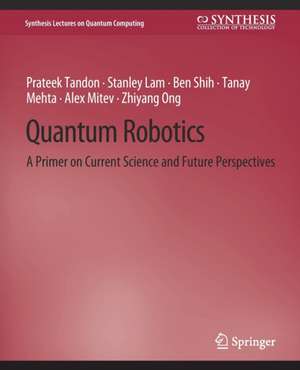Quantum Robotics: A Primer on Current Science and Future Perspectives: Synthesis Lectures on Quantum Computing
Autor Prateek Tandon, Stanley Lam, Ben Shih, Tanay Mehta, Alex Mitev, Zhiyang Ongen Limba Engleză Paperback – 17 ian 2017
Preț: 383.17 lei
Nou
Puncte Express: 575
Preț estimativ în valută:
73.32€ • 76.06$ • 61.14£
73.32€ • 76.06$ • 61.14£
Carte tipărită la comandă
Livrare economică 27 martie-10 aprilie
Preluare comenzi: 021 569.72.76
Specificații
ISBN-13: 9783031013928
ISBN-10: 3031013921
Pagini: 133
Ilustrații: XVI, 133 p.
Dimensiuni: 191 x 235 mm
Greutate: 0.3 kg
Editura: Springer International Publishing
Colecția Springer
Seria Synthesis Lectures on Quantum Computing
Locul publicării:Cham, Switzerland
ISBN-10: 3031013921
Pagini: 133
Ilustrații: XVI, 133 p.
Dimensiuni: 191 x 235 mm
Greutate: 0.3 kg
Editura: Springer International Publishing
Colecția Springer
Seria Synthesis Lectures on Quantum Computing
Locul publicării:Cham, Switzerland
Cuprins
Preface.- Acknowledgments.- Notation.- Introduction.- Relevant Background on Quantum Mechanics.- Quantum Search.- Quantum Agent Models.- Machine Learning Mechanisms for Quantum Robotics.- Quantum Filtering and Control.- Current Strategies for Quantum Implementation.- Conclusion.- Bibliography.- Authors' Biographies.- Index.
Notă biografică
John Heywood is a Professorial Fellow Emeritus of Trinity College Dublin-University of Dublin. He was given the best research publication award of the Division for the Professions of the American Educational Research Association for Engineering Education: Research and Development in the Curriculum and Instruction in 2006. Recently, he published The Assessment of Learning in Engineering Education: Practice and Policy. Previous studies among his 150 publications have included ""Learning, Adaptability and Change; The Challenge for Education and Industry,"" and co-authored Analysing Jobs, a study of engineers at work. He is a Fellow of the American Society for Engineering Education, a Fellow of the Institute of Electrical and Electronic Engineers, and an Honorary Fellow of the Institute of Engineers of Ireland. In 2016 he received the Pro Ecclesia et Pontifice award from the Pope for his services to education.
John Heywood is a Professorial Fellow Emeritus of Trinity College Dublin-University of Dublin. He was given the best research publication award of the Division for the Professions of the American Educational Research Association for Engineering Education: Research and Development in the Curriculum and Instruction in 2006. Recently, he published The Assessment of Learning in Engineering Education: Practice and Policy. Previous studies among his 150 publications have included ""Learning, Adaptability and Change; The Challenge for Education and Industry,"" and co-authored Analysing Jobs, a study of engineers at work. He is a Fellow of the American Society for Engineering Education, a Fellow of the Institute of Electrical and Electronic Engineers, and an Honorary Fellow of the Institute of Engineers of Ireland. In 2016 he received the Pro Ecclesia et Pontifice award from the Pope for his servicesto education.
Benjamin Shih is a Ph.D. student in Mechanical and Aerospace Engineering at the University of California, San Diego. He holds an M.S. and B.S. in Electrical and Computer Engineering from Carnegie Mellon University (2013) and has been a research assistant at Ecole Polytechnique Federale de Lausanne. His main area of research is soft robotics, an intersection of control, materials, and cognitive science. Ben led discussion of quantum control in the Quantum Robotics Group.
Tanay Mehta is a Ph.D. student in Computer Science at Northeastern University. He holds a B.S. in mathematics from the University of Southern California. His research is focused on the theoretical aspects of computer science and the fundamental limits of computation. He is interested in the role ofpseudo-randomness in complexity theory and cryptography. Tanay served as the lead for quantum information theory discussions in the Quantum Robotics Group.
Alex Mitev holds a Ph.D. in Electrical Engineering from the University of Arizona. His main research interests are in statistical modeling, model order reduction, machine learning, and dynamic programming. He has published several papers analyzing problems of timing analysis, macro-modeling, and the impact of process variations for VLSI circuits. Alex led discussions of quantum circuits in the Quantum Robotics Group.
Zhiyang Ong is an Electrical Engineering Ph.D. student at Texas A&M University. He received his M.S. in Electrical Engineering from the University of Southern California and his Bachelor of Engineering (Electrical and Electronic) from the University of Adelaide. He has interned at the Institute of Microelectronics and Bioinformatics Institute in Singapore, Symantec Corporation in Santa Monica, California, and the University of Trento in Trento, Italy. He has also studied at the University of Verona and National Taiwan University. He is a student member of IEEE and ACM and is a member of IEEE-Eta Kappa Nu. Zhiyang led discussions of quantum modeling checking in the Quantum Robotics Group.













